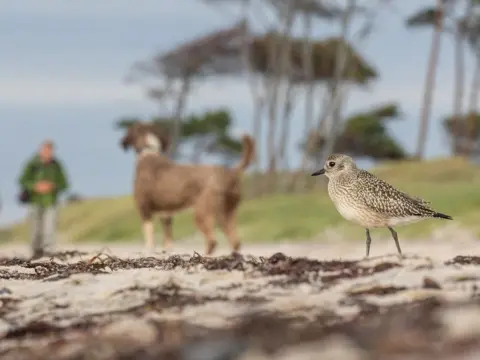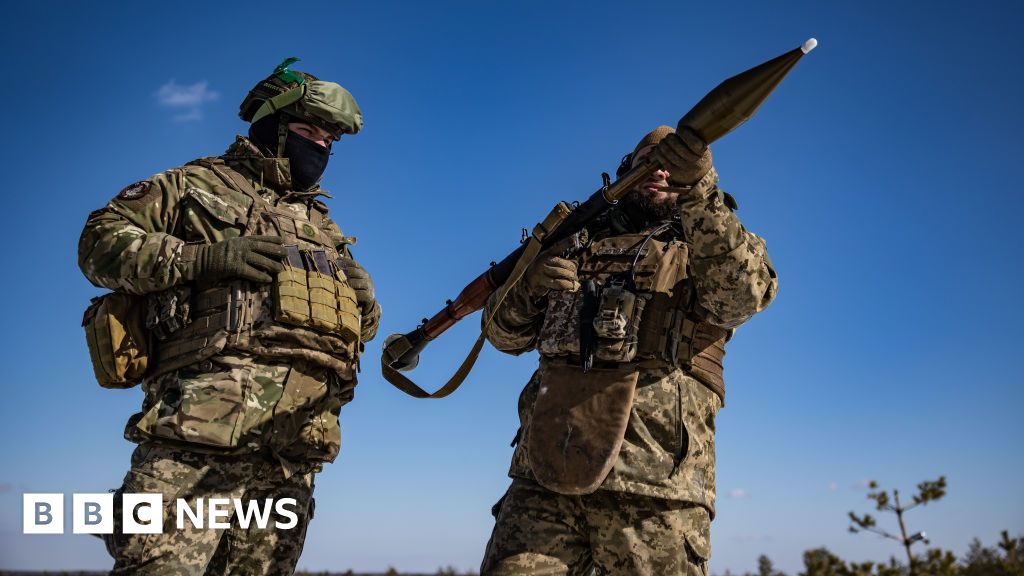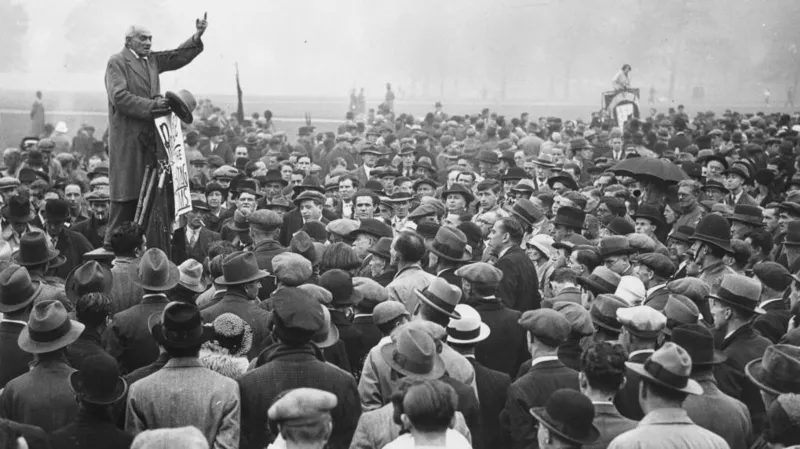The Bird Photographer of the Year award has been announced, with Canadian photographer Patricia Homonylo scooping the top prize for her thought-provoking image titled When Worlds Collide.
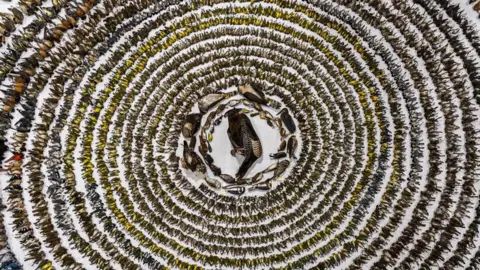 Patricia Homonylo/Bird Photographer of the Year
Patricia Homonylo/Bird Photographer of the YearThe picture was taken in Toronto and beat more than 23,000 entries to claim the prize.
The photograph shows more than 4,000 birds that died colliding with windows and other reflective surfaces in the city.
“Each year more than one billion birds die in North America alone due to collisions with windows,” says Homonylo.
“I am a conservation photojournalist and have been working with the Fatal Light Awareness Program, where we save window-collision survivors in Toronto.
“Sadly, most of the birds we find are already dead.
“They are collected and at the end of the year we create this impactful display to honour the lives lost and increase public awareness.”
Homonylo’s entry was also among the winners selected for the Conservation (Single Image) category.
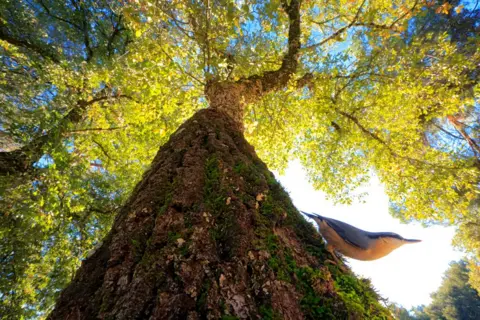 Andrés Luis Domínguez Blanco/Bird Photographer of the Year
Andrés Luis Domínguez Blanco/Bird Photographer of the YearThe Young Bird Photographer of the Year 2024 was awarded to 14-year-old Spanish photographer Andrés Luis Domínguez Blanco for his creative angle on a nuthatch scrambling down an oak tree.
Photographers competed in a eight of different categories in the adult competition, including a Conservation Award, Portfolio Award, and Video Award.
Here is a selection of the pictures that were awarded a gold, silver or bronze, with descriptions by the photographers.
Playful Fledgling, Southern California, United States by Jack Zhi
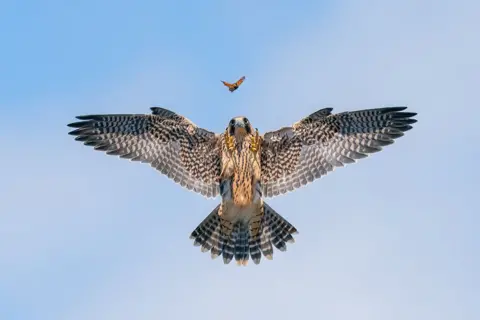 Jack Zhi/Bird Photographer of the Year
Jack Zhi/Bird Photographer of the Year“This Peregrine Falcon fledgling had been flying for over a week and his skills had improved by the day.
“While he still took food from parents, he had started to practise his hunting skills.
“He was not good enough to catch live birds in the air yet, so he took baby steps by chasing a fluttering butterfly.
“I have been photographing peregrines for years, and this was the first time I have seen fledglings play with butterflies.”
Black Grouse, Kuusamo, Finland by Markus Varesvuo
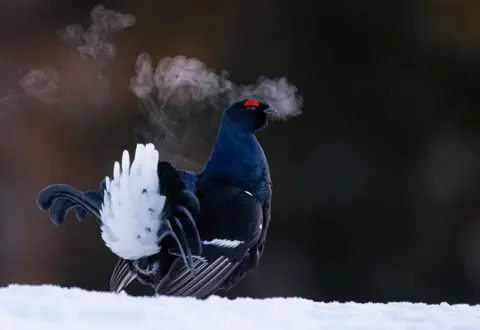 Markus Varesvuo/Bird Photographer of the Year
Markus Varesvuo/Bird Photographer of the Year“For several weeks each year, Black Grouse gather at [the] leks on spring mornings for courtship and display.
“The males come down, each claiming their patch, and spend a couple of hours sizing each other up, charging at each other, engaging in mostly mock battles.
“Sometimes, however, the encounters escalate to real fights.
“The heated breath of a solitary fighter is steaming in the cold air, which I captured while sitting inside a small photography hide, revelling in the sounds and sights of this ancient play.”
Heavenly Elegant Flight, France by Nicolas Groffal
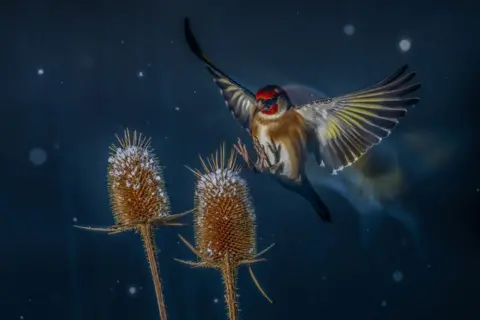 Nicolas Groffal/Bird Photographer of the Year
Nicolas Groffal/Bird Photographer of the Year“In the dead of winter, I marvel at the aerial ballet of the garden birds that come to visit my trees and to take advantage of the seeds that I put out for them.
“Discreetly hidden, I tried to immortalise their flight and its delicate trail using a flash and camera in ‘rear curtain’ mode.
“Hundreds of shots were required before I captured the perfect moment, which portrayed the fleeting magic of nature in winter.”
Immersion, Shetland, UK by Kat Zhou
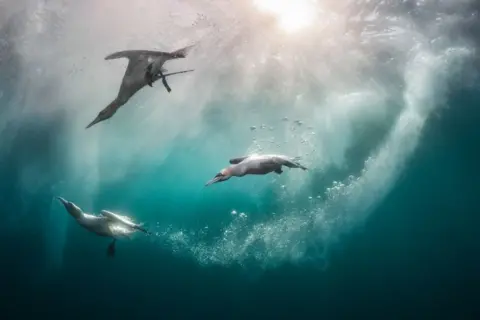 Kat Zhou/Bird Photographer of the Year
Kat Zhou/Bird Photographer of the Year“Here we see a trio of northern gannets diving into the ocean on a sunny day in Shetland. .
“The species is Scotland’s largest seabird, and they are remarkably adept in the water, with the ability to dive to depths as far as 22 metres.
“I took this photo while scuba diving from a boat near Noss, which is home to the UK’s seventh largest colony of northern gannets.
“In the past the population has been estimated at around 25,000 birds, though their numbers were unfortunately severely reduced by the avian flu outbreak.
“It is unclear when, or if, their population will be able to recover. Dead herring from a local herring fishery were used to attract the birds to the boat.”
Hippo Impression, Sydney, Australia by David Stowe
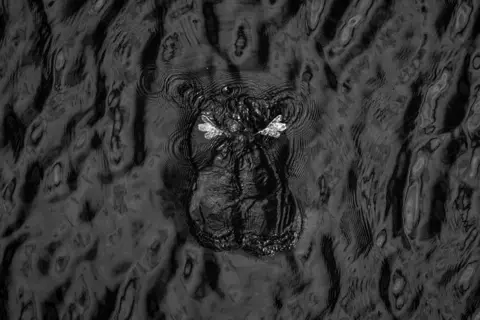 David Stowe/Bird Photographer of the Year
David Stowe/Bird Photographer of the Year“This photograph shows a hoary-headed grebe as it disappears below the surface of the water to feed, pushing into the depths with its huge paddle-like feet.
“I took the image from a raised platform high above the wetland.
“With a little bit of imagination, the combination of bird and ripples look like the head of a hippo.”
Helmetshrikes Preparing to Sleep, Sabi Sands Nature Reserve, South Africa by Gary Collyer
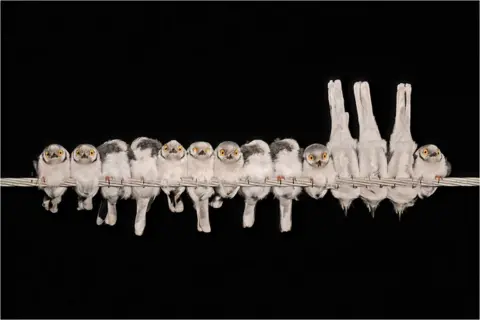 Gary Collyer/Bird Photographer of the Year
Gary Collyer/Bird Photographer of the Year“We were on a safari, and returning to camp in Sabi Sands, South Africa, on a dark March evening.
“We stopped, having picked up some unusual sounds, although unsure what they were.
“Then we heard chattering and fluttering high above us.
“When illuminated with the lamp on the vehicle, we saw these helmetshrikes huddling together against a night that was starting to turn colder.”
Treacherous Journey, Warsaw, Poland by Grzegorz Długosz
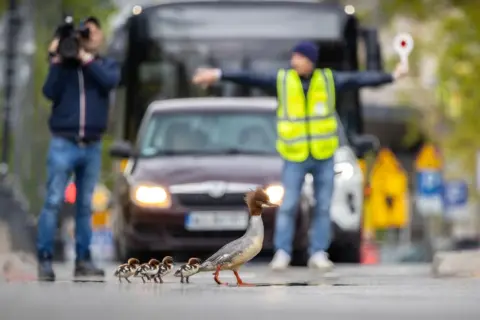 Grzegorz Długosz/Bird Photographer of the Year
Grzegorz Długosz/Bird Photographer of the Year“Goosanders breed in the park about one kilometre from Poland’s life-giving River Vistula.
“Each mother has to move her brood to the river as quickly as possible due to lack of food and safety in the park.
“They make the journey through a series of underground passages and over a six-lane highway.
“Each year a group of volunteers help them cross this deadly road by stopping the traffic.
“This image shows a mother goosander crossing a smaller road because she decided not to use the scary and dark underground passage below it.”
Inmates, Bali, Indonesia by Cheng Kang
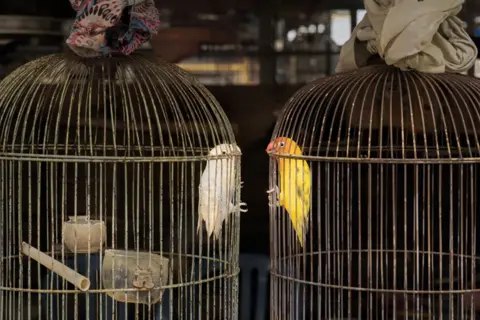 Cheng Kang/Bird Photographer of the Year
Cheng Kang/Bird Photographer of the Year“This poignant image captures the harsh reality in one of Bali’s bird markets.
“The pair of lovebirds face each other in separate cages, appearing to say their final farewells, not knowing if they will see each other again.
“Who knows what joys they would have experienced together in their lush native rainforests and whether they will ever experience that again.
“Their silent connection transcends physical barriers, emphasising the complex interaction between yearning for freedom and the urge to escape from captivity for human pleasure.”
Human and Nature (and dog), Mecklenburg-Western Pomerania, Germany by Emil Wagner
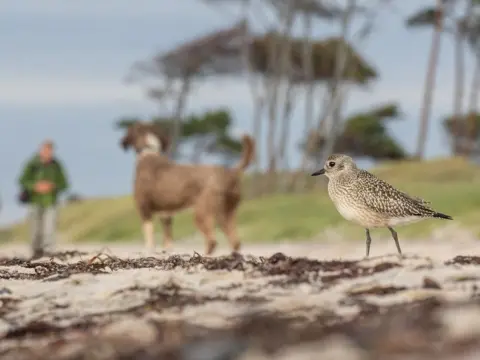 Emil Wagner/Bird Photographer of the Year
Emil Wagner/Bird Photographer of the Year“I took this photo on a beautiful beach on the Baltic Sea.
“There are a number of waders and other birds here, but also many visitors who enjoy the beautiful landscape.
“In this case there was also a dog who initially did not notice the grey plover. The grey plover, however, did notice the dog and flew away shortly after I took the photo.
“While I do not believe this incident greatly stressed the bird, it is crucial to acknowledge the potential impact of human activity and tourism on protected species and their habitats.”
Turbulent Fish Hunt, Lake Federsee, Bad Buchau, Germany by Julian Mendla
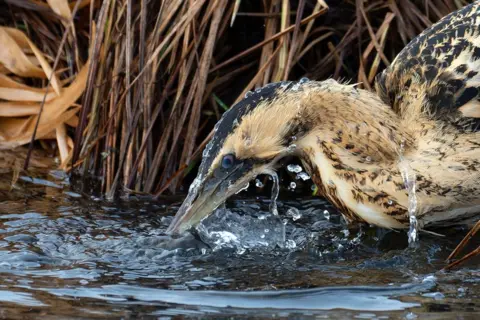 Julia Mendla/Bird Photographer of the Year
Julia Mendla/Bird Photographer of the Year“Lake Federsee is a famous wintering area for numerous migratory birds.
“From November to March, Eurasian bitterns are frequent visitors to this lake.
“As soon as the lake freezes over, these rare birds retreat to trenches through the reeds.
“Surprisingly, this individual was very close to the boardwalk that leads through the nature reserve.
“From there, I could easily watch its fishing campaign and take numerous photos.”
